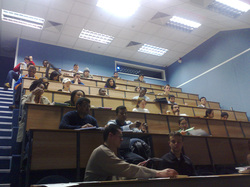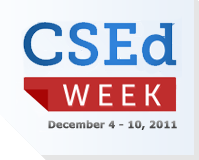 The founder of the Khan Academy asks, "what if we were to separate the teaching and credentialing roles of universities?" He continues the idea to say there would be "rigorous, internationally recognized assessments that measured your understanding in proficiency in various fields." Those exist today. Consider the technical, information systems, computer science field. A quick search reveals no less than 130+ tool or technology specific certifications for IT professionals. These range from operating systems to cyber security to application specific credentials. There are many more by profession including human resources, systems engineering, systems architecture, and program manager disciplines. The Professional Engineer credential is another distinguished certification. Students ask about Credentials As a professor, I often get asked which credentials are best to get and I always respond with the undergraduate or graduate degree. These teach us the discipline, the process, the knowledge, and often technique to approach problem solving. The lessons learned in undergraduate (and graduate) programs have "staying" power - they stay with students long after the degree has been completed and credential received. Industry or Tool Specific Certifications One of the issues I see with these assessments is they are specific to a tool or a version of a tool. To demonstrate mastery of a specific tool, these credentials may be considered worthy, but would not replace an education. Perhaps we have heard the term "paper MCSE", those individuals who have the credential, but are ineffective at their positions. This post from 2005 is an example where the individual passed the exams, but observed "the only problem was that I didn't know squat." Another problem is the tools change through subsequent releases, feature upgrades, mergers, and acquisitions. If one mastered an operating system in 2001, the platform has undoubtedly changed 11 years later. Complimentary Certifications and Traditional Education There are high schools that teach traditional curriculum as well as IT certifications such as the Cisco CCNA and/or CISSP. Some higher education institutions include courses or modules that prepare students for certification exams. Industry certifications can be used to bolster a career or improve technical skills and practitioner skills after a university degree program is completed. To answer the first question, I'm not sure why one would separate teaching and credentialing. I have not even addressed the complexities of exam bias and bias on the international scale. Will post more on this later including the important social aspect of learning and education. /jd
0 Comments
 In USA Today, St. Joseph's College senior Ashley Santucci shares five things in college not to be taken for granted. 1. Campus Events 2. Textbooks 3. Professors (yes!) 4. Career Centers 5. Walking around campus I would add to Ashley's list, "6. Leadership Opportunities" such as student government, clubs, and organizations. These allow students to become familar with volunteering, participating in committees, learning Robert's Rules of Order, etc. _ I encourage all students to take advantage of the opportunities within the college or university. Access to vast amounts of resources, libraries, and scholarly professors can be one of the most rewarding experiences.  Computer Science Education Week (CSEdWeek) December 4-10, 2011 – is a call to action to share information and offer activities that will advocate for computing and elevate computer science education for students at all levels. Everyone can participate! Some ideas for College and Higher Ed professors:
 Ideas for Professionals and Industry:
|
AuthorDirector Archives
January 2023
Categories
All
|
Photos from europeanspaceagency, ▓▒░ TORLEY ░▒▓, Lori_NY, Dean_Groom, dalecruse, Fin Cosplay & Amigurumi, Iain Farrell, erin_everlasting, palindrome6996, Easa Shamih (eEko) | P.h.o.t.o.g.r.a.p.h.y, markhillary, Matt McGee, Marc_Smith, woodleywonderworks, agustilopez, rachel_titiriga, SeaDave, cheri lucas., Caio H. Nunes, grabbingsand, Armchair Aviator, quinn.anya, Jennifer Kumar, billaday, edtechworkshop, chucknado, purpleslog, yugenro, christianeager, dground, GlasgowAmateur, expertinfantry, shixart1985 (CC BY 2.0), OiMax, Wilfried Martens Centre for European Studies, PEO, Assembled Chemical Weapons Alternatives, IBM Research, shixart1985, markus119, shixart1985, shixart1985, Wilfried Martens Centre for European Studies


 RSS Feed
RSS Feed
